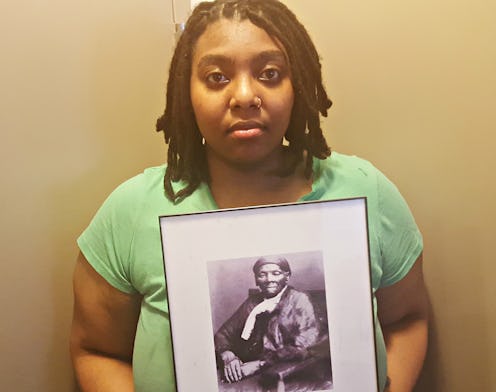Life
What The New $20 Bill Means To Me As A Black Woman

On April 20, The U.S. Treasury announced an unexpected move to diversify America’s currency: By 2030 or sooner, America’s money will feature radical freedom fighters on the front and back of the $5, $10, and $20 bills. Martin Luther King Jr. will appear on the back of the $5 bill. Activist Sojourner Truth will grace the back of the $10 bill alongside Alice Paul, Susan B. Anthony, and other suffragettes. And Harriet Tubman — the revolutionary abolitionist who organized the Underground Railroad and led thousands of slaves to freedom — will replace the (genocidal) former president Andrew Jackson on the front of the $20 bill.
When the unexpected news hit, I immediately felt pools of tears gather. A framed photo of Tubman hangs beside the desk in my home office. It reads: "I had reasoned this out in my mind, there was one of two things I had a right to, liberty of death; If I could not have one, I would have the other." Each day, she peers at me, and her piercing eyes tell me we are still not free; that I must continue to use words to illuminate the issues keeping us from freedom.
Taking the news in, I began to weep. I hoped that this offered a way forward, that instead of pretending that slavery didn't happen or doesn't have lingering consequences, we can be forced to acknowledge it every day — and work toward equality. This felt like hope.
Tubman, born Araminta Ross on a plantation in Dorchester County, Maryland, was an unrelenting warrior. She rallied for her freedom — and the freedom of her people — even when enslavement was viewed as the price paid for simply being born black. In 1849, Tubman escaped the plantation. But instead of being satisfied with her own freedom, she created the Underground Railroad, a series of safe houses that guided escaped slaves to freedom. She even returned to her own plantation, as well as others in the South, to help thousands of slaves escape.
Soon, when we reach in our wallets for $20 bills, her gaze will peer back at us. It will remind us of America’s fraught history of enslavement — our country's wealth built on the backs of Africans — and that our work is still not done. In a world where black women make 60 cents to every $1 a white man makes, where black girls are systemically pushed out of schools and into the criminal justice system, and where black womanhood is appropriated at the same time that our systemic challenges are disregarded, representation matters.
It's normal for white people to see themselves on money. I want my nieces to know that it's normal for a black woman to grace a $20 bill. I imagine a world where my nieces will see Tubman on currency and will never have known a time before it. They will be able to see themselves and their history represented when they reach into their wallets, a type of normalcy that still eludes black people.
It fills me with joy to know that Tubman’s unsmiling face will greet those who reach into their wallets, and remind them the subjugation of black people isn’t over.
Of course, placing Tubman’s face on the $20 bill isn’t a solution to these rampant problems. Affixing her likeness on currency isn’t a magical resolution to racism, just as electing Barack Obama president wasn’t. But Tubman won’t let America forget what it has done to our people. It's not coincidental that schools in wealthier communities offer better educations, and that those schools often exclude students of color. It is purposeful that people of color have lower net worths than white people, and that it's a perpetual struggle for black people to escape poverty. There’s still a penalty for being black, and that hasn’t ceased, even after Tubman’s death. But seeing this icon on our money will make us remember that while we’re far from equality, we're still fighting toward it.
Of course, there are critiques to be made here: many argue that the capitalism the dollar represents is the very type of oppressive structure Tubman was fighting against. It offers wealth to a select few while simultaneously resigning many to generational poverty. That is the antithesis of freedom, and should be critiqued. Considering Tubman and other enslaved people were considered commodities, it is difficult to fathom her being OK with her face being placed on the very tool used to justify her mistreatment. Furthermore, Tubman won't be on the $20 bill alone, as she should be. The U.S. Treasury said that Jackson, who was instrumental in American Indian genocide during the Trail of Tears, will still appear on the back of the bill. Even in triumph, a free black woman born enslaved still has to share her moment with a cruel slave-owner. Plus, we will have to wait until 2030, a length of time that seems unnecessary and vaguely taunting.
All of these issues make this victory bittersweet. Yet, in celebrating this moment, we're not ignoring the impact of capitalism or overlooking these glaring problems. We’re just recognizing that representation matters, and that Tubman’s memory matters.
We will not forget her. We will not forget what she sacrificed to free some of our ancestors. It fills me with joy to know that Tubman’s unsmiling face will greet those who reach into their wallets, and remind them the subjugation of black people isn’t over. It is a way to honor this abolitionist while also remembering her work. The $20 bill isn’t enough, but it’s a start — and this black woman is proud.
Image: Evette Dionne